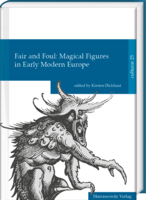|
|
more titles of the subject:
This volume publishes the results of a project on magical fiction and figures funded by the Fritz Thyssen Foundation, which emerged from a conference focusing on the magus and his creative capacities before and after the Counter-Reformation. The conceptual debate of magia goes back to the French 17th century, when, for example, fireworks were discussed as magic.
The contributions focus on the Italian 16th century and compare it with European literatures. The essays share a common interest in the question of the contemporary examination of magic, which is characterized both by the magia naturalis as a prototype of the natural sciences and by demonology in the reception of the Hexenhammer. The literary models of magicians focus on the role of the artistic form (for example as hieroglyphs), its ethical potential (criticism of magic) and specific effects, made possible by magic or as such can only be called magic, because it is simply about phenomena or processes that have not yet been named. The concept of magic is thus used to negotiate the relationship between imitation and creation, government and control, external influence and internal impetus, which is central for literary concepts and natural sciences. This volume shows the extent to which epics and theater, the Aristotelian genres, are a historical setting of specific experiments with different concepts of magic. |






